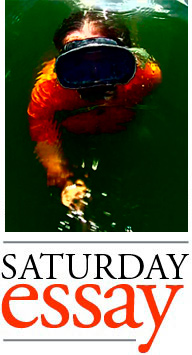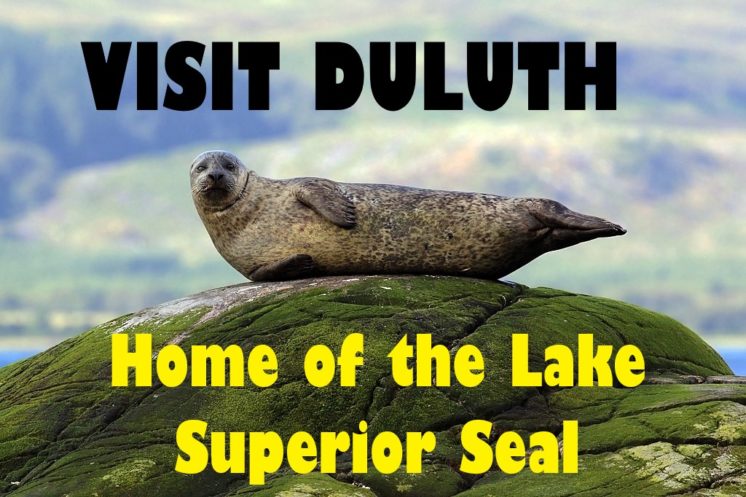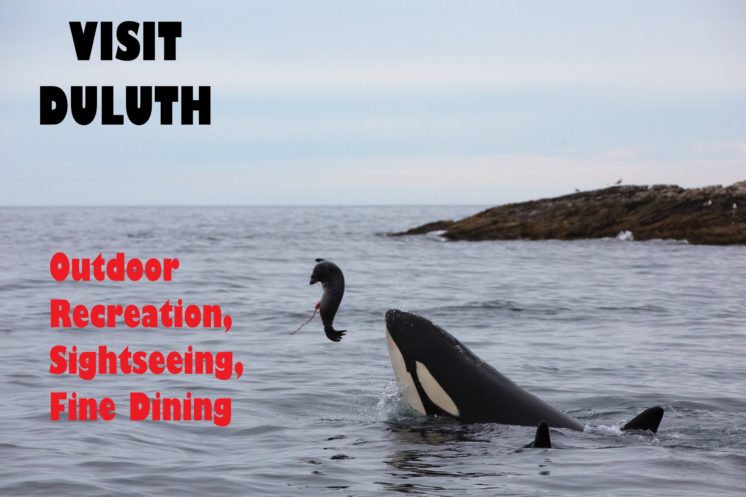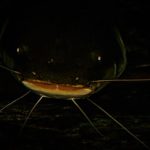Stock Lake Superior with Seals and Orca Whales: A Modest Proposal
 To the Mayor of Duluth and the City Council: I propose that the city stock Lake Superior with seals, and a community of orcas to keep the seals in check. This plan increases annual tourist revenue by $300,000,000. I outline my proposal below with expenditures.
To the Mayor of Duluth and the City Council: I propose that the city stock Lake Superior with seals, and a community of orcas to keep the seals in check. This plan increases annual tourist revenue by $300,000,000. I outline my proposal below with expenditures.
Seals can live in freshwater. The only population of exclusively-freshwater seals is native to the ratchet Lake Baikal in Russia, the Baikal seals. But geopolitical issues preclude obtaining breeding pairs. Therefore we need to look closer to home: Quebec has harbor seals in a couple lakes, a subspecies of the common seal called the Ungava seal. But, the Ungava is endangered so if we import them, we should establish a breeding program, increasing expenses.
Fortunately, Iliamna Lake in Alaska has a population of common seals trapped there. I suggest we capture and import specimens from that population to get ours started. Technically saltwater seals, the common seals’ adaptability to freshwater has been proven which will give them a head start in Lake Superior. I’ll throw in a couple Ungavas on the house to increase genetic diversity. Estimated cost of capturing and importing 100 breeding pairs of seals from Lake Iliamna: $3,500,000.
Seals eat salmon, herring, sculpin, and ducks, so Lake Superior should support them easily; in fact they may even munch on invasive zebra mussels like popcorn if we’re lucky, outweighing costs to local fisheries. Potential annual regional savings to zebra mussel control efforts: $10,000,000.
Seals are primarily coastal, but their presence on Lake Superior beaches should not prove too intrusive for human enjoyment of those natural areas. Mating occurs underwater — the seals, I mean! — and pups wean after 4-6 weeks. Seals would be able to dive to the deepest parts of Lake Superior and return to the surface to nap adorably on the beach, as four-foot-high killer whale dorsal fins cut the open sea, the canal, and the harbor. Picture educational dramas of orcas hurling themselves onto the sands of Park Point to ambush seal pups. These new, marketable fauna will boost tourism on our shores. Estimated increase in annual Duluth tourism revenue: $300,000,000.
Orcas from transient pods already used to eating seals should be targeted for relocation. Estimated cost of six breeding pairs of orca whales: $12,500,000.
A seal population might consume hundreds of salmon per day, so any orca eating a one-hundred-pound seal per day would take pressure off the salmon population. One study from Kitsap County in Washington state showed 12 orcas eating one-third to one-half of 1,500 seals in seven weeks, saving thousands of salmon. Estimated annual savings to salmon industry: $2,000,000.
It’s possible orcas could deplete the seal population to the point where the whales would have to eat more fish. This could adversely affect the fishing industry. In that unlikely case, I would recommend importing sea lions. The orcas would prey on them instead, allowing the seal community to bounce back. That’s just good management. Something Duluthians know a lot about.
Summary
- Annual Savings to Current Duluth City Budget: $3,000,000
- Annual Savings to Lake Superior Region: $12,000,000
- Increased Annual Duluth Tourist Revenue: $300,000,000
- My expenses: a bargain at merely $16,000,000. Your savings alone cover nearly the full cost, payable in two installments: half up front, with the remainder upon completion. If sea lions become necessary, I require the right of first refusal on the contract. Direct all inquiries to my attorney.
I look forward to doing business with you.
Please see the Appendix for Duluth’s historical connection to these magnificent creatures.
Signed,
Lake Superior Aquaman
Appendix
Recently discovered correspondence from the Antarctic explorer Ernest Shackleton sheds light on the overlooked role of Jacques Cloquet, the Duluthian among Shackleton’s men.
Years after their association, the old Shackleton penned a letter to a cousin about him. Shackleton was spent, busted, and scared to go on new adventures. But he reminisced about Cloquet’s good humor in 1916 when they were marooned in sea-ice on the Endurance. The passage reads:
…I became part of the blackness as the sun slipped beneath the mysterious horizon for the last time, God’s eye closing, forsaking, numberless months of night to go. Orcas all around in the dangerous lifeboat traverses. I can’t believe we lived through it, thank God. Later, hounded by the press in London, I imagined them as an orca pod, knocking against my little boat, spray of their monstrous breath on the star-lit air. Or in daylight bursting their heads through ice to size up the dogs. I think of our Minnesotan Cook’s Assistant, Jacques Cloquet the wandering Duluthian who boarded at Cape Horn – the position was vacant due to influenza, and Cloquet got the job when we tasted his albatross eggs and goat cheese on toast. He spirited me with his jibes as we sat trapped:
‘Captain sir, this ice-sheet chewing up our ship only reminds me of home. Why, I’ve eaten worse things than boiled penguin in Duluth. That long winter city well-prepared me for marooning in the Antarctic night. I should have brought my curling gear, the Club plays on Lake Superior every chance we get to an amused audience. We even race cars there, the whole town comes, ice thick enough to support a train. I’ve seen ice-sheets destroy two breakwater walls, so it is no surprise the Endurance groans so. She is consumed in a jagged-tooth hell mouth that will swallow her to the bottom, there to lie undiscovered for a century until machine descendants of Jules Verne spy her sailing proud in the deep, enduring yet, Captain sir. The lifeboats are prepared for the crossing. These orcas don’t scare me sir. Every sea, if worthy of the name, should bear such monsters. If it were up to me, Jacques Cloquet of Duluth, Minnesota, who someday men will call a hero, I would personally stock Lake Superior with orca whales. And any such food as they might prefer, such as the common seal. If nothing else Captain Shackleton sir, this mission has scientifically proven that seal meat is quite comestible, if I do say so myself.’
An index of Jim Richardson’s essays may be found here.
Recommended Links:
Leave a Comment
Only registered members can post a comment , Login / Register Here
















3 Comments
Matthijs
about 3 years agoMr. Nied
about 3 years agoJim Richardson (aka Lake Superior Aquaman)
about 3 years ago